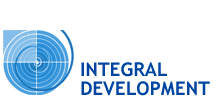
Over thirty years ago the motto used by the Australian Labor Party was ‘It’s Time!’. At Integral Development, we believe that ‘It’s Time!’ for Integral Theory to shape the way we look at, work and behave in the world.
The Macquarie Dictionary (www.macquariedictionary.com.au) defines ‘integral’ as “…of or relating to a whole; belonging as a part of the whole; constituent or component; necessary to the completeness of the whole; made up of parts which together constitute a whole…”.
Individually, a whole person comprises the integration of physical, mental, emotional and spiritual parts, along with the person’s skills and vision for their future.
Organisationally, to achieve commercial success, the whole organisation must comprise the integration of many parts, including staff wellbeing and development, customer service, products that meet a demand, worthwhile contribution to the community and environmental impact reduction.
While many organisations attend to some of these things well, few organisations attend to all of them superbly. At Integral Development we are helping to develop well-integrated individuals to become well-integrated leaders in well-integrated organisations that make a positive contribution to the community and the wider world.
Integral Theory was developed by the philosopher and transpersonal psychologist, Ken Wilber, and represents one of the most profound perspectives of the 21st century. There are many writers who have provided self-help theories on how we can live better lives, but Ken Wilber provides extraordinary insights into Eastern and Western philosophy, psychology, science and spirituality relevant to the 21st century. His books, such as A Theory of Everything (Shambhala Publications), describe the key components of his ‘Integral All Quadrants, All Levels Theory’.
Integral Theory comprises many parts and Integral Development has distilled these into practical tools for leaders, managers, teams and organisations. One such tool is Integral Development’s 3600 Leadership & Management Profile that facilitates personal and professional feedback to the individual, team effectiveness assessment, organisational surveys and team role profiles that in turn interface with a number of other commercially available tools and products.
While it is the tools that individuals and organisations first experience when working with Integral Development, it is the direct personal contact between our clients and Integral Development’s consultants and coaches that is integral to successful outcomes.
Integral Development’s tools can be applied to a range of individual, team and organisational requirements, but the essence of our work is in understanding that everyone and everything is connected in the universe and that when we act as individuals or organisations, a truly worthwhile purpose can be achieved with integration.
For example, in the workplace a leader’s aim might be to achieve strategic organisational goals and profit, but if that leader is a well-integrated individual it is possible to develop personally and professionally to achieve a level of integration where one truly realises that ‘I am the world’ and what I and my organisation do is an integral part of it. It is at this level that a leader can make significant contributions to improving themselves, the organisation, the community and the world, whilst establishing and maintaining harmony with the natural environment.
Every day we hear but are somehow disconnected from news of the hungry and homeless, the impact of national and international conflict and the impact of global warming. At closer quarters we hear expressions of discontent with the work/life balance and the impact of stress on the individual. What we usually do not hear is the possibility of resolving what ails us via integration on all levels.
In today’s highly competitive, helter-skelter environment in which individuals and organisations function, it requires commitment to implement an integrated vision. To this I say – It’s Time!













